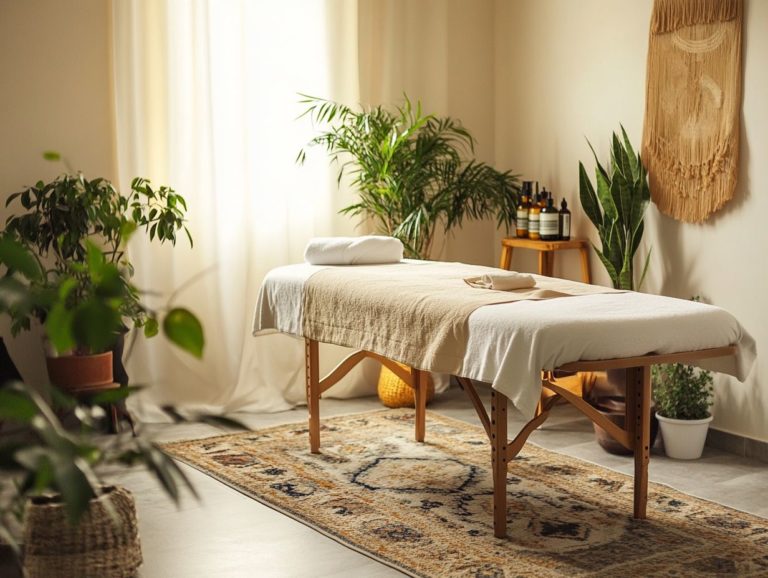5 Natural Approaches to Anxiety Relief in Naturopathy
Anxiety can indeed feel overwhelming, but you’ll discover amazing holistic approaches that can bring you real relief. Naturopathy, with its emphasis on natural remedies and the body’s intrinsic healing abilities, presents a range of effective techniques for you to explore.
Consider five natural methods for alleviating anxiety:
- Mind-body techniques
- Herbal remedies
- Nutritional supplements
- Acupuncture
- Aromatherapy
Delve into the core principles of naturopathy, be aware of any potential side effects, and discover how to seamlessly integrate these practices into your daily life. This journey can lead you to a calmer, more balanced state of being.
Contents
Key Takeaways:
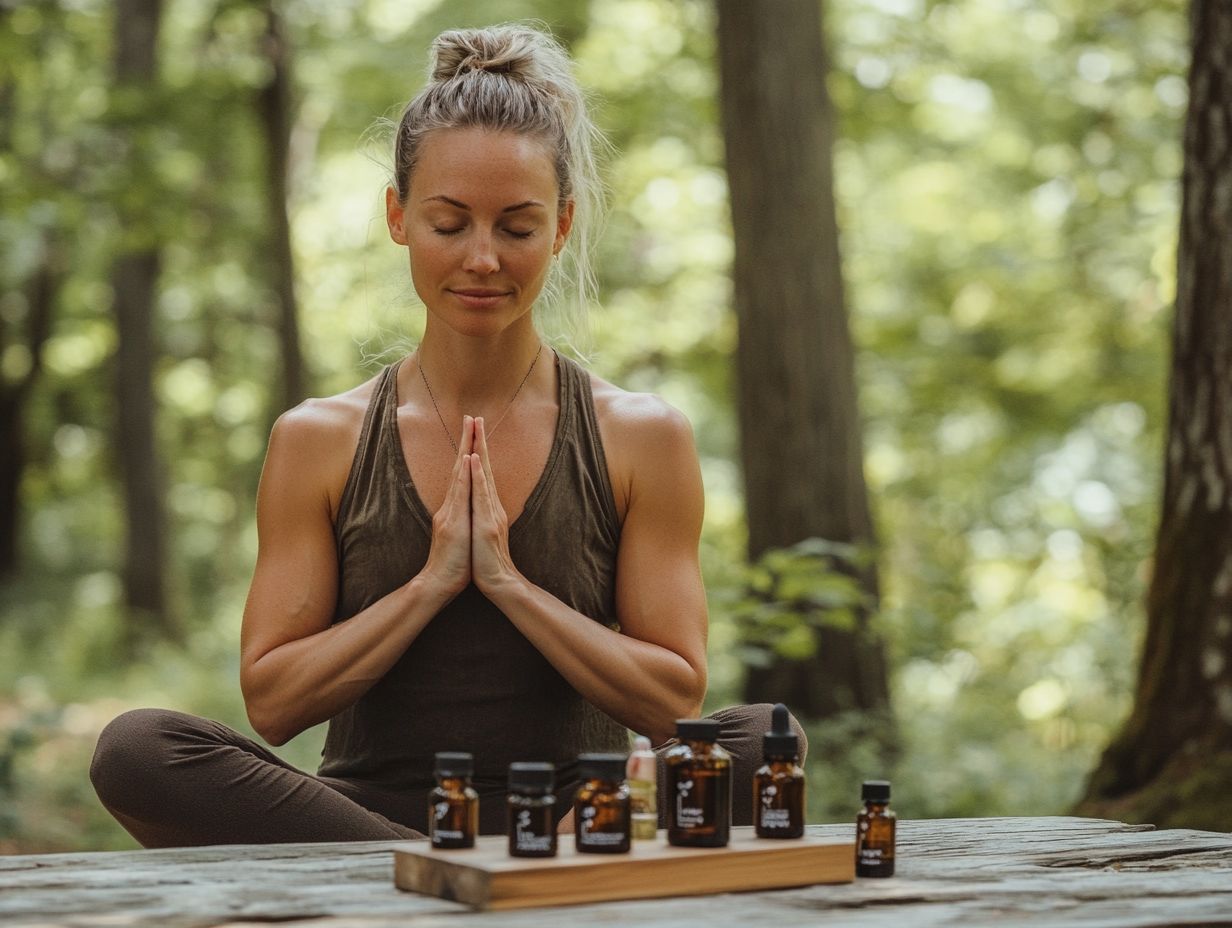
- Mind-body techniques, such as deep breathing and meditation, can help reduce anxiety and promote relaxation.
- Herbal remedies, like chamomile and passionflower, have been found to be effective in reducing anxiety symptoms.
- Nutritional supplements, like omega-3 fatty acids and vitamin B complex, can support the body’s natural response to stress and anxiety.
1. Mind-Body Techniques
Mind-body techniques play a pivotal role in managing anxiety, highlighting the profound connection between mental health and physical well-being. By exploring approaches such as mindfulness meditation and relaxation techniques, you can significantly alleviate anxiety symptoms while gaining a deeper understanding of your body and its stress responses.
This holistic strategy underscores the importance of integrating behavioral treatments and therapeutic exercises, offering you a comprehensive framework for tackling anxiety disorders. By nurturing that vital mind-body connection, you can cultivate resilience against chronic nervousness, ultimately enhancing your overall wellness and psychological stability.
Practices like yoga not only improve your physical flexibility but also promote mental clarity through breath control and movement, grounding your anxious mind.
Engaging in therapeutic exercises releases endorphins, giving you that much-needed sense of well-being. These activities can transform the pathways in the brain that control your stress response, giving you the power to better manage anxiety triggers.
By adopting a regular routine that includes these techniques, you can build emotional resilience, leading to improved mental health and a greater capacity to navigate life’s challenges.
2. Herbal Remedies
Herbal remedies are gaining recognition for their potential to alleviate anxiety symptoms, presenting a natural alternative to traditional treatments that you might find appealing.
Research suggests these remedies can modulate the stress response system in the body. For example, ashwagandha has been shown to lower cortisol levels, effectively reducing feelings of stress and anxiety.
Lavender oil, known for its calming aroma, is linked to decreased heart rates and improved moods. Passionflower extract may enhance gamma-aminobutyric acid (GABA) activity in the brain, promoting a sense of relaxation.
When you compare these herbal options to conventional medications like serotonin reuptake inhibitors (SSRIs), you’ll find that they often come with fewer side effects. This makes them an attractive choice for those seeking a gentler, more natural approach to managing mental health.
3. Nutritional Supplements
Nutritional supplements can play a crucial role in managing anxiety, especially if you re facing nutritional deficiencies that might intensify your symptoms. Supplements like magnesium, GABA, and probiotics have shown promise in supporting mental health and alleviating anxiety disorders.
By focusing on dietary interventions and integrating these supplements into your routine, you can enhance your overall well-being and build resilience against emotional stressors, leading to a better stress response and relief from symptoms.
These supplements operate through various mechanisms that support mental health, such as promoting neurotransmitter balance and reducing inflammation. For instance, magnesium helps regulate cortisol levels, the hormone linked to stress, which contributes to a calmer mindset. GABA inhibits neural activity, providing a natural sedative effect, while probiotics positively impact gut-brain communication, essential for emotional health.
When you pair these supplements with lifestyle choices like regular exercise, sufficient sleep, and mindfulness practices, you can create a comprehensive approach to managing anxiety more effectively.
Start your journey to a calmer life today by trying these natural approaches!
4. Acupuncture
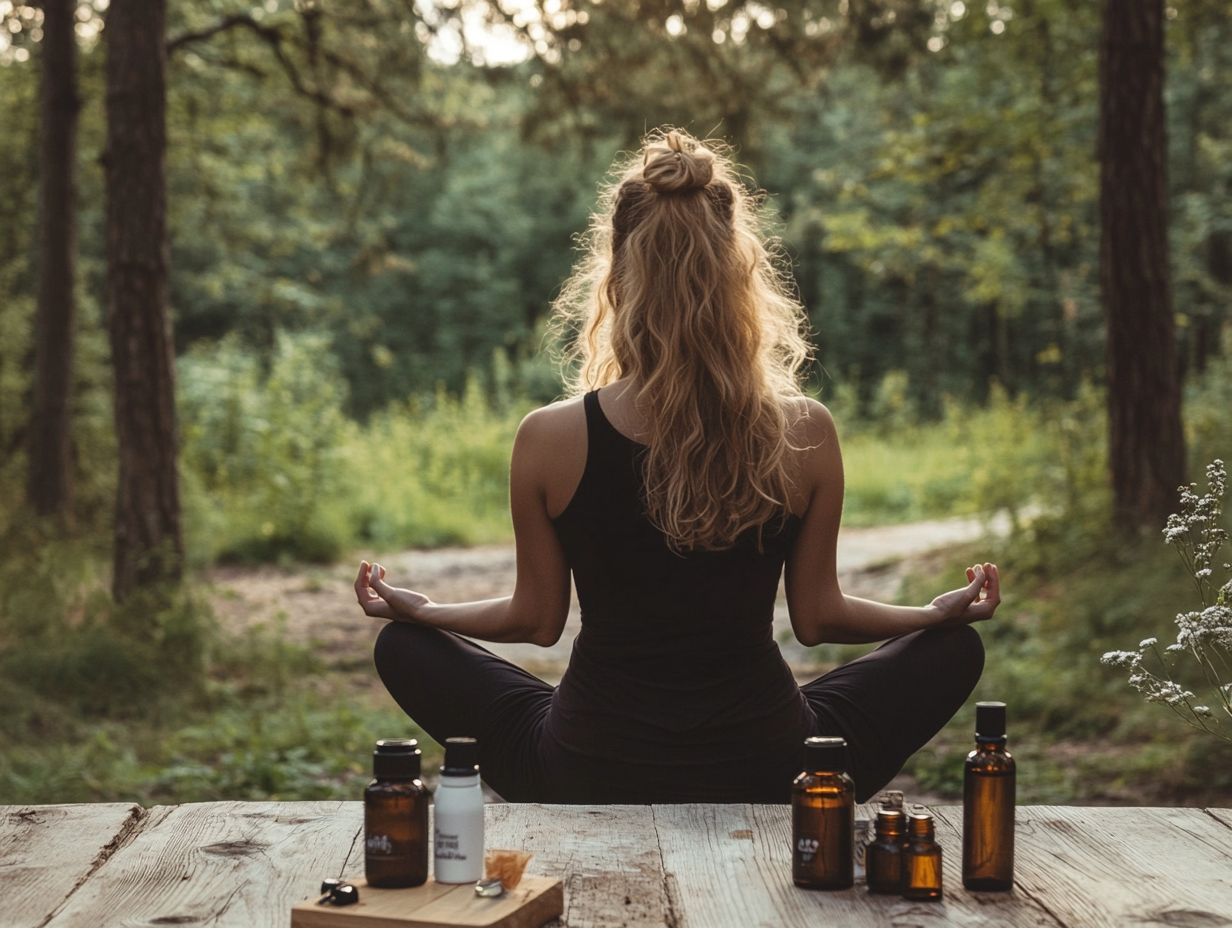
Are you ready to conquer your anxiety? Acupuncture might be your answer! This holistic approach has gained traction as a natural remedy for alleviating anxiety.
It taps into your body’s energy pathways to promote balance and well-being. This ancient practice addresses both physical discomfort and emotional stressors fueling anxiety disorders.
By stimulating specific points, acupuncture can help reduce your stress and enhance mental clarity. It s a valuable tool for managing chronic nervousness.
Recent studies show significant reductions in anxiety levels for those undergoing treatment. When combined with behavioral therapies and nutritional interventions, acupuncture amplifies therapeutic outcomes.
Many individuals report fewer stress-related symptoms after several sessions. This indicates that acupuncture can effectively complement conventional treatments, fostering a greater sense of calm and stability.
5. Aromatherapy
Aromatherapy presents a calming path for managing anxiety. It uses essential oils like lavender to bring tranquility into your life.
These oils can reduce anxiety symptoms and promote relaxation. Aromatherapy creates a soothing ambiance that harmonizes beautifully with other therapeutic approaches.
Essential oils such as chamomile and bergamot are equally effective. Chamomile helps alleviate tension and promotes restful sleep, while bergamot uplifts your mood.
Incorporating aromatherapy into your routine is easy. Consider diffusing oils during meditation or adding them to your bath for a tranquil experience.
When paired with practices like yoga or breathing exercises, aromatherapy becomes even more powerful. It provides a comprehensive strategy for tackling anxiety.
What Is Naturopathy and How Does It Help with Anxiety?
Naturopathy offers a natural approach to health care that emphasizes your body’s ability to heal itself. It combines various therapies, such as dietary changes and herbal medicine, to address anxiety and promote mental health, including natural remedies for headaches.
Naturopathic doctors focus on your unique needs, crafting personalized therapies that foster resilience against anxiety disorders. This approach recognizes the connection between mental and physical health.
Unlike conventional medicine, which often relies on pharmaceuticals, naturopathy for stress management uncovers the root causes of anxiety. It offers solutions like nutritional counseling and mindfulness techniques.
By treating the whole person, you embark on a comprehensive healing journey. You ll learn to harness your strengths and resources, empowering you to manage your mental health effectively and sustainably.
What Are the Key Principles of Naturopathy?
The core principles of naturopathy center on the belief that your body possesses the natural ability to heal itself. This emphasizes a holistic approach to health and well-being.
As you engage with doctors who focus on natural healing methods, you’ll notice their focus on prevention and uncovering the root causes of anxiety rather than simply alleviating symptoms.
By nurturing self-healing and promoting lifestyle choices that bolster both emotional and physical health, naturopathy gives you the power on your wellness journey.
In this framework, the healing power of nature is paramount. Simply spending time in natural environments and adopting a balanced diet rich in whole foods can significantly enhance your mood and diminish stress levels.
Treating the whole person means addressing not just the psychological dimensions of anxiety, but also the physical, social, and environmental factors that contribute to it.
Prioritizing prevention empowers you to adopt sustainable practices like mindfulness, regular exercise, and quality sleep essential elements for enhancing your mental well-being.
These holistic strategies foster resilience, making it easier for you to navigate life’s challenges and maintain emotional equilibrium.
How Can Naturopathy Help with Anxiety?
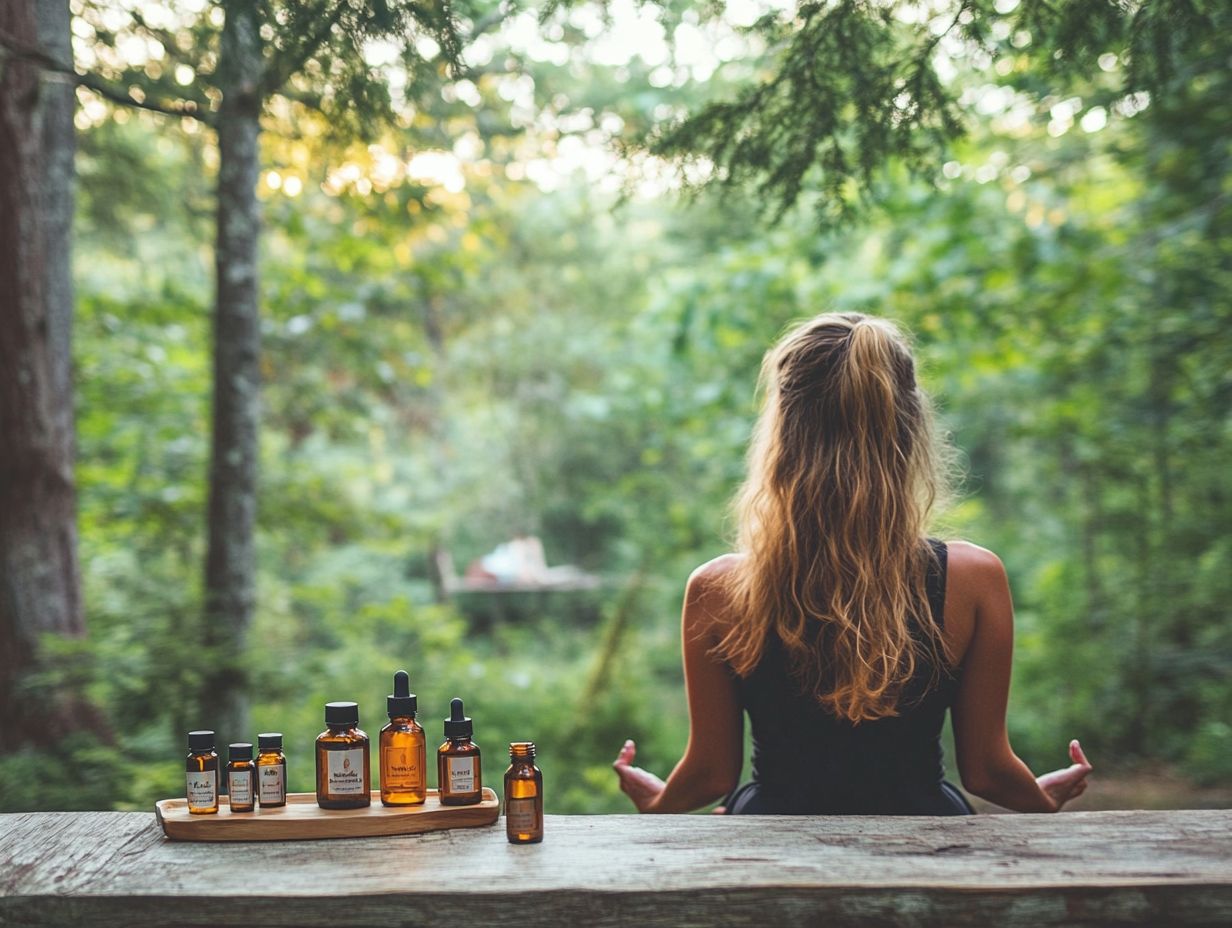
Naturopat a puede ser un cambio de juego para las personas que luchan con la ansiedad, ofreciendo una variedad de tratamientos naturales y un enfoque hol stico dise ado espec ficamente para tus necesidades nicas.
Al combinar terapias conductuales, cambios diet ticos y remedios herbales, los m dicos natur patas profundizan en las dimensiones mentales y f sicas de los trastornos de ansiedad. Esta estrategia multifac tica no solo ayuda a aliviar los s ntomas, sino que tambi n transforma tu comprensi n de tus factores de estr s emocional y sus efectos en tu salud general.
A trav s de t cnicas como la atenci n plena, la gesti n del estr s y ajustes en el estilo de vida, la naturopat a crea un entorno de curaci n nutritivo.
Los remedios herbales como la manzanilla y el ashwagandha son a menudo recomendados por sus efectos calmantes. Suplementos nutricionales como los cidos grasos omega-3 y el magnesio pueden fortalecer a n m s la estabilidad emocional.
Reconociendo que tus experiencias y desencadenantes son distintos, la naturopat a pone un fuerte nfasis en planes de tratamiento personalizados. Esto garantiza una gesti n efectiva de la ansiedad y te empodera para tomar el control de tu salud mental, allanando el camino para un alivio duradero y una vida m s plena.
What Are the Potential Side Effects of Naturopathic Treatments for Anxiety?
While naturopathic treatments for anxiety are generally regarded as safe, it’s essential to recognize that potential side effects can arise from using herbal medicine and dietary supplements. Exploring naturopathic techniques for emotional healing can provide additional support.
Understanding these risks is crucial for anyone exploring natural treatments. Some herbal remedies might interact with prescribed medications or worsen existing health conditions.
By consulting with qualified naturopathic doctors, you can navigate potential side effects more effectively and ensure your anxiety management plan is both safe and effective.
Commonly used supplements, like St. John s Wort and valerian root, might lead to adverse reactions such as gastrointestinal upset or fatigue. It’s also important to remember that herbal treatments aren t always regulated, raising valid concerns about their purity and dosage.
Professionals can offer personalized insights based on your unique health profile, helping to pinpoint underlying issues that could complicate your treatment.
With expert guidance, you can make informed decisions that enhance your overall well-being while minimizing the risks associated with self-prescribing herbal interventions.
How Can One Incorporate Naturopathy into Their Daily Life for Anxiety Relief?
Incorporating naturopathic approaches to mental health into your daily life can be a game changer for anxiety relief. Your lifestyle choices significantly impact your overall mental health. Simple practices like mindfulness meditation, engaging in therapeutic exercises, and adopting a nutrient-rich diet can greatly enhance your emotional well-being.
Regular consultations with naturopathic doctors allow you to tailor your approach to meet your specific needs, creating a solid framework for long-term anxiety management.
By weaving these practices into your daily routine, you can cultivate a more centered and harmonious existence. For instance, starting your day with a few minutes of deep breathing exercises can ground your thoughts and prepare your mind for the challenges ahead.
Incorporating whole foods that are rich in omega-3 fatty acids and antioxidants into your meals nourishes your body and supports cognitive clarity. Setting aside time for gentle activities like yoga or tai chi strengthens your body and promotes a profound sense of calm.
These simple changes create a vibrant path to a balanced life, fostering resilience against anxiety.
What Are Some Other Natural Approaches to Anxiety Relief?
Numerous natural approaches to anxiety relief align seamlessly with the principles of naturopathy. Techniques like cognitive behavioral therapy (CBT), a type of therapy that helps you notice and change negative thoughts, mindfulness practices, and exploring naturopathic treatments for anxiety can significantly reduce anxiety.
By addressing cognitive distortions and enhancing the gut-brain connection, these methods provide valuable alternatives to traditional medications. They help you cultivate a more balanced emotional state.
Incorporating behavioral therapies enables you to gain insights into your thought patterns, fostering a healthier mindset that further alleviates anxiety. Regular physical activity boosts your mood and reduces anxiety.
Stress management techniques such as deep breathing exercises and meditation promote mindfulness. They ground you during moments of anxiety. Together, these elements create a synergistic relationship with naturopathy, empowering you to take proactive steps toward your emotional well-being.
Frequently Asked Questions
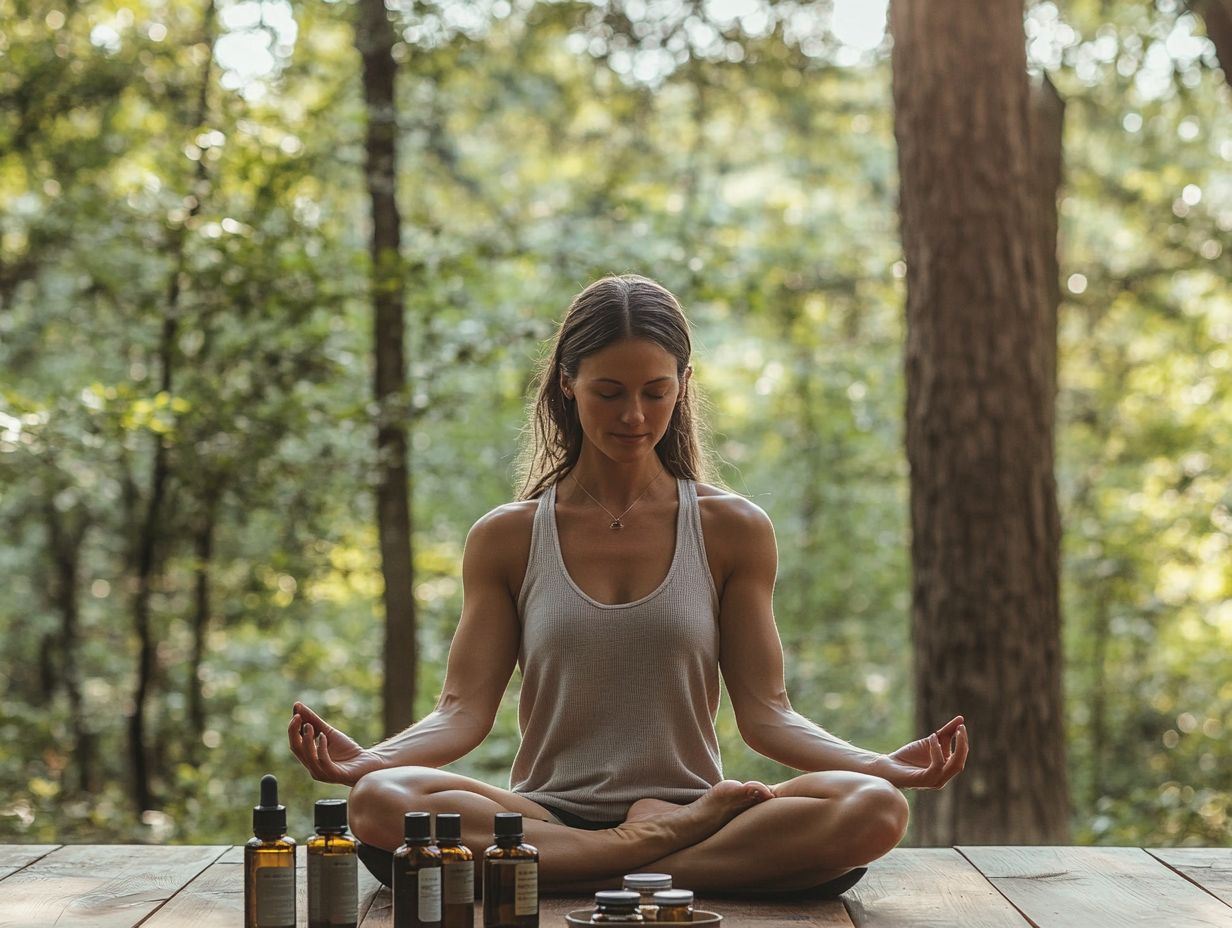
What are the 5 natural approaches to anxiety relief in naturopathy?
The 5 natural approaches to anxiety relief in naturopathy are:
- Herbal remedies
- Nutrition and diet
- Exercise
- Relaxation techniques
- Mind-body therapies
These approaches focus on treating the root cause of anxiety and promoting overall well-being.
How do herbal remedies help with anxiety relief?
Herbal remedies such as chamomile, lavender, and passionflower have been traditionally used to reduce anxiety symptoms. They have calming and sedative effects on the body, promoting relaxation and reducing stress levels.
Can nutrition and diet affect anxiety levels?
Yes, nutrition and diet play a crucial role in managing anxiety. Eating a balanced diet with plenty of whole foods and healthy fats, while avoiding processed foods, can help regulate mood and reduce anxiety symptoms. Certain nutrients like magnesium, omega-3 fatty acids, and B vitamins have been linked to anxiety relief.
What types of exercises can help with anxiety relief?
Regular physical activity can help improve mood and reduce anxiety. Activities like yoga, walking, and swimming have been shown to be beneficial for managing anxiety. They promote relaxation, release endorphins, and improve overall physical and mental well-being.
Which relaxation techniques are effective for anxiety relief?
Relaxation techniques like deep breathing, meditation, and progressive muscle relaxation can help reduce anxiety symptoms by promoting a state of calm. These techniques can be easily practiced at home and have proven effective in managing anxiety.
How can mind-body therapies help with anxiety relief?
Mind-body therapies such as acupuncture, massage therapy, and biofeedback have been found beneficial for managing anxiety. These therapies focus on balancing the mind-body connection, promoting relaxation, and reducing stress and anxiety levels.
Start incorporating these strategies today for a calmer tomorrow!






